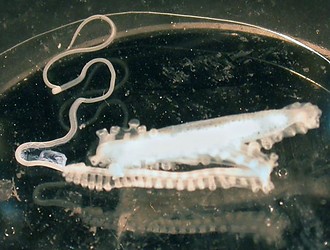Argonautoidea
Richard E. Young and Michael Vecchione


This tree diagram shows the relationships between several groups of organisms.
The root of the current tree connects the organisms featured in this tree to their containing group and the rest of the Tree of Life. The basal branching point in the tree represents the ancestor of the other groups in the tree. This ancestor diversified over time into several descendent subgroups, which are represented as internal nodes and terminal taxa to the right.

You can click on the root to travel down the Tree of Life all the way to the root of all Life, and you can click on the names of descendent subgroups to travel up the Tree of Life all the way to individual species.
For more information on ToL tree formatting, please see Interpreting the Tree or Classification. To learn more about phylogenetic trees, please visit our Phylogenetic Biology pages.
close boxIntroduction
All four families of the Argonautoidea are pelagic although one (Alloposidae) is "associated" with the ocean floor. The families are primarily distinguished by an unusual means of copulation which involves transferring a detached hectocotylus from the male to the female. The clade includes gelatinous species as well as very muscular species.
Brief diagnosis:
An incirrate octopod ...
- with detachable hectocotylus.
Characteristics
- Arms
- Arm suckers in two series (grade to single series near mouth in Haliphron).
- One of third arm pair entirely hectocotylized and enrolled in a sac or pouch prior to use.
- Hectocotylized arm autotomizes (i. e., detaches) during copulation.
- Funnel
- Funnel-locking apparatus well developed but structure differs among families.
- Funnel-locking apparatus well developed but structure differs among families.
- Sexual dimorphism
- Males much smaller than females; males dwarfs in three families.
- Males much smaller than females; males dwarfs in three families.
- Shell
- Internal shell present only in Alloposidae; shell lost in other families.
- Internal shell present only in Alloposidae; shell lost in other families.
- Radula
- Radula heteroglossan.
Discussion of Phylogenetic Relationships
Naef (1923) suggested that the argonautoid families were derived from the Octopodidae and presented a phylogeny, shown above in the title frame, based on the characteristics of the hectocotylus.
Voight (1997), in a cladistic study using mostly different characters, presented a less resolved phylogeny:
\ ------ Alloposidae
\ / ----- Argonautidae
\/ /
\/------ Ocythoidae
\
\----- Tremoctopodidae
References
Naef, A. 1921/23. Cephalopoda. Fauna und Flora des Golfes von Neapel. Monograph, no. 35.
Nesis, K. N. 1982. Abridged key to the cephalopod mollusks of the world's ocean. 385+ii pp. Light and Food Industry Publishing House, Moscow. (In Russian.). Translated into English by B. S. Levitov, ed. by L. A. Burgess (1987), Cephalopods of the world. T. F. H. Publications, Neptune City, NJ, 351pp.
Voight, J. R. 1997. Cladistic analysis of the octopods based on anatomical characters. J. Moll. Stud. 63: 311-325.
About This Page

University of Hawaii, Honolulu, HI, USA

National Museum of Natural History, Washington, D. C. , USA
Page copyright © 2013 and
 Page: Tree of Life
Argonautoidea .
Authored by
Richard E. Young and Michael Vecchione.
The TEXT of this page is licensed under the
Creative Commons Attribution-NonCommercial License - Version 3.0. Note that images and other media
featured on this page are each governed by their own license, and they may or may not be available
for reuse. Click on an image or a media link to access the media data window, which provides the
relevant licensing information. For the general terms and conditions of ToL material reuse and
redistribution, please see the Tree of Life Copyright
Policies.
Page: Tree of Life
Argonautoidea .
Authored by
Richard E. Young and Michael Vecchione.
The TEXT of this page is licensed under the
Creative Commons Attribution-NonCommercial License - Version 3.0. Note that images and other media
featured on this page are each governed by their own license, and they may or may not be available
for reuse. Click on an image or a media link to access the media data window, which provides the
relevant licensing information. For the general terms and conditions of ToL material reuse and
redistribution, please see the Tree of Life Copyright
Policies.
- Content changed 21 October 2008
Citing this page:
Young, Richard E. and Michael Vecchione. 2008. Argonautoidea . Version 21 October 2008. http://tolweb.org/Argonautoidea/20192/2008.10.21 in The Tree of Life Web Project, http://tolweb.org/










 Go to quick links
Go to quick search
Go to navigation for this section of the ToL site
Go to detailed links for the ToL site
Go to quick links
Go to quick search
Go to navigation for this section of the ToL site
Go to detailed links for the ToL site